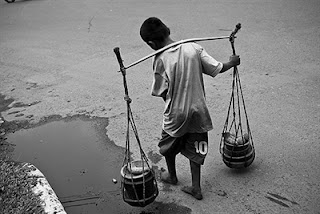The cycle of poverty has been described as a phenomenon where poor families become trapped in poverty for generations.
Because they have no or limited access to critical recourses, such as
· educational and
· financial services
Subsequent generations are impoverished.
There are multiple cycles of poverty-based on, among other things.
· economic,
· Social,
· spiritual and
· geographical factors
Many cycles overlap or perpetuate new cycles and therefore any attempt to depict the cycle of poverty will be far more simplistic than realistic.
The figure below shows –in every simplistic terms- how a cycle of poverty related to hunger keeps a person or household poor in one of the world’s developing countries.













